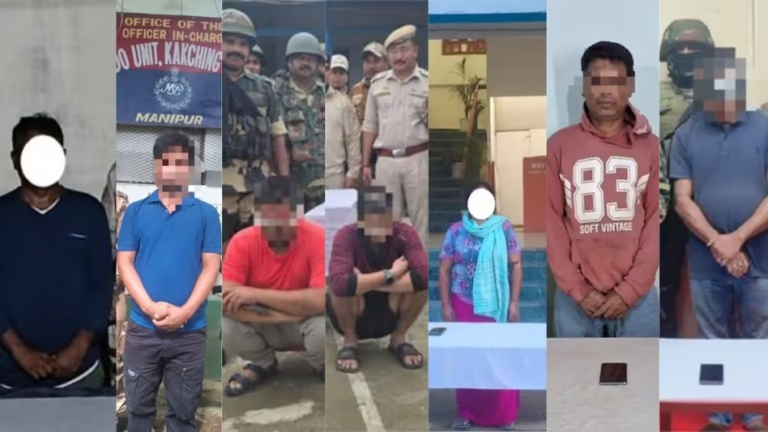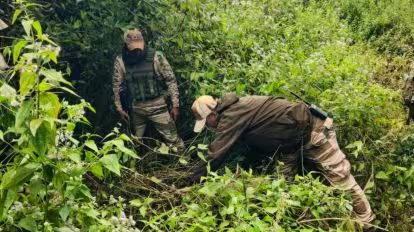Indefinite Shutdown Imposed on NH-37 in Tousem: A Closer Look
Summary:
The town of Tousem in Manipur has imposed an indefinite shutdown on National Highway 37 (NH-37). This protest stems from grievances related to poor infrastructure and a demand for better road conditions. The shutdown has impacted local transportation and supply routes, affecting daily life and commerce in the region.
The Struggles of Tousem: An Overview
When you think about infrastructure, especially roads, it’s easy to take it for granted if you live in a well-connected area. However, in many parts of India, especially in the Northeastern states like Manipur, road conditions can make or break the daily lives of residents. Recently, the town of Tousem, a remote area in Manipur, has faced significant hardship due to the state of its roadways, prompting an indefinite shutdown of NH-37, a vital lifeline for the region.
The shutdown, spearheaded by local groups, stems from longstanding grievances over the condition of National Highway 37, which has been in a state of neglect for years. This highway is a crucial route, serving as one of the primary connections for people and goods. However, years of poor maintenance and government inaction have left residents frustrated and feeling ignored.
Why the Shutdown? A Deeper Dive into the Core Issues
The Condition of NH-37
The main issue that triggered the indefinite shutdown is the deplorable condition of NH-37. This highway is not just a random stretch of road; it’s a vital artery for the movement of goods, food supplies, and emergency services. Over time, poor maintenance has left it riddled with potholes, erosion, and unsafe driving conditions, making it a challenge for vehicles to pass through, particularly during the monsoon season.
A History of Neglect
The town of Tousem and surrounding regions have long been grappling with poor infrastructure. Promises made by the government for road repairs and development often remain unfulfilled. This negligence is not new—local groups have raised concerns about the deteriorating road conditions for years, but little has been done to address the issues.
Impact on Daily Life
The shutdown has disrupted the lives of many residents in the region. With NH-37 closed, transportation has been severely hampered. People rely on this highway not just for commuting but for access to medical facilities, schools, and basic necessities. When a town is cut off like this, it has a domino effect on all aspects of life—from the availability of essential goods to the ability of people to reach work or emergency services.
What’s at Stake for Tousem?
Economic Fallout
Tousem, like many other regions in Manipur, is heavily reliant on the transportation of goods and services along NH-37. With the indefinite shutdown, supply chains have come to a grinding halt. Shops are running low on essential supplies, and traders are unable to move their goods. In a region where agriculture is a primary source of livelihood, the disruption in transport is having a serious economic impact on farmers who are unable to get their produce to markets.
Education and Health Services Affected
Children who travel long distances to attend school are finding it increasingly difficult to do so. Likewise, healthcare services have been severely impacted, with ambulances struggling to navigate the damaged roads. In emergency situations, the condition of the highway could be the difference between life and death, as patients may not be able to reach hospitals in time.
Government Response: Promises vs. Reality
Promises of Infrastructure Development
Over the years, there have been multiple promises made by both state and central governments to improve road conditions in Manipur, especially in remote areas like Tousem. On paper, there have been budgets allocated and plans proposed to revamp NH-37 and other critical infrastructure. However, on the ground, progress has been slow, if not non-existent.
The repeated failure of the government to act on these promises has resulted in a lack of trust among the people. This shutdown is not just about a road—it’s about the years of neglect and the widening gap between government assurances and actual action.
The Current Situation: What is Being Done?
Following the imposition of the shutdown, government officials have been in talks with local leaders to find a resolution. There are assurances that the highway will soon undergo repairs and that steps will be taken to prevent future neglect. However, the people of Tousem remain skeptical, as they have heard these promises before. For many, the real question is whether these commitments will finally be followed through or whether they will remain empty words.
The Role of Civil Society and Protests
Why Protests Matter
Protests are one of the few tools available to the residents of remote areas like Tousem to make their voices heard. In many ways, this shutdown is a last-ditch effort to draw attention to the critical issues facing the region. In a country as large and diverse as India, rural voices often get drowned out by the concerns of urban centers, making it harder for their problems to gain traction in the national discourse.
The indefinite shutdown of NH-37 is a bold step taken by the people of Tousem. It’s a move that reflects their desperation, but also their determination to ensure that their community is not forgotten.
Civil Society’s Role in Addressing the Issue
Civil society organizations in Manipur have also joined the call for better infrastructure, urging both the state and central governments to take immediate action. These groups argue that improved road conditions are not just a matter of convenience but a human rights issue. Access to essential services, mobility, and economic opportunities are all directly tied to the state of infrastructure.
The Road Ahead: Potential Solutions
Immediate Repairs and Long-term Planning
The immediate priority should be the repair of NH-37, ensuring that the road is functional and safe for travel. However, beyond this short-term fix, there needs to be a long-term strategy for maintaining infrastructure in regions like Tousem. Periodic inspections, timely maintenance, and accountability mechanisms must be put in place to ensure that such issues do not recur.
Involving the Community
One of the most effective ways to ensure that infrastructure projects are executed properly is by involving the local community in the planning and monitoring process. When people have a say in the development of their own regions, there is a greater chance of transparency and accountability.
Building Trust Through Action
Ultimately, the government must recognize that trust cannot be built through words alone—it requires tangible action. The people of Tousem need to see visible progress, not just promises. Repairing the road is only the first step in rebuilding the faith of the community in their elected representatives.
Conclusion: A Call for Change
The indefinite shutdown of NH-37 is a reflection of the broader issues facing remote regions like Tousem. It’s a reminder that infrastructure is not just about roads—it’s about access, opportunity, and dignity. As the town of Tousem waits for action, it serves as a poignant example of how neglect can push communities to the brink.
For the people of Tousem, the road ahead is uncertain. But one thing is clear: they will no longer remain silent. The shutdown is not just a protest; it’s a call for change, and the time for that change is now.
FAQs
- Why was NH-37 shut down in Tousem?
The highway was shut down due to prolonged neglect and poor road conditions, prompting protests from local residents. - How has the shutdown impacted daily life in Tousem?
The shutdown has severely disrupted transportation, supply chains, education, and access to healthcare in the region. - What has the government promised in response to the shutdown?
The government has promised to repair the highway and take steps to ensure better maintenance moving forward. - Is this the first time such a protest has occurred in Manipur?
No, protests over infrastructure issues have occurred before, as residents in many remote regions often feel neglected. - What can be done to prevent future shutdowns of this nature?
Ensuring regular maintenance, involving the local community in infrastructure planning, and delivering on government promises are key measures to prevent future incidents.


